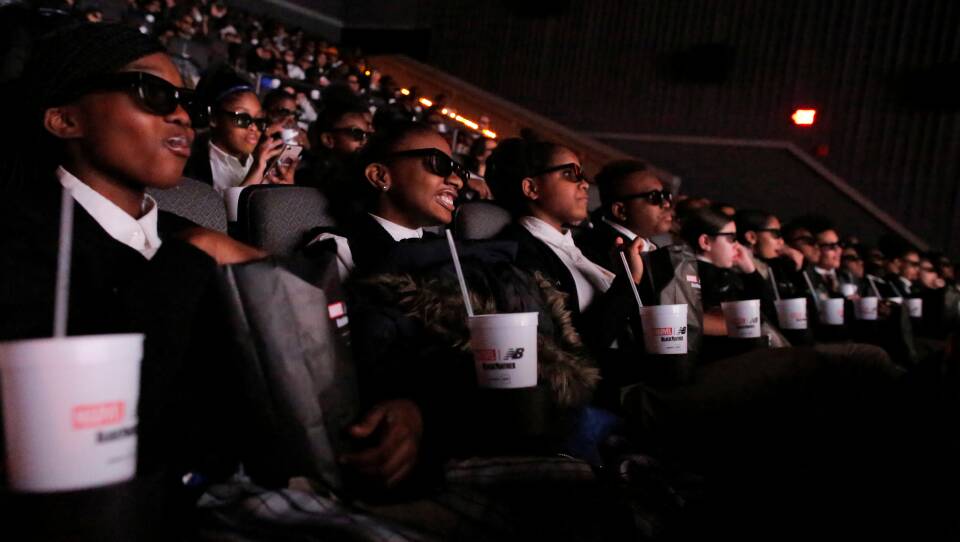Marvel Comics' blockbuster "Black Panther" has stirred up all sorts of debate.
Hana Baba and Leila Day, hosts of the podcast The Stoop, checked it out this weekend. They tell The World's Marco Werman they were pleasantly surprised, even though they were more than a little worried going in.
Happy #BlackPanther night!https://t.co/YsiCHWmlQs
— The Stoop (@theStoopPodcast) February 16, 2018
Hana Baba: I'm not used to Africa being seen in a positive light at all in media — whether it's TV or film — growing up. Never. I can't remember seeing Africa portrayed in a way that made me proud to be from Africa.
Related: Creators of a new podcast are unpacking black identity
HB: Just from the get-go, Africa was shown as a modern place — a futuristic, highly technological place. I went into the movie tense, just like I had "Coming to America"-phobia or like post-traumatic "Coming to America" disorder.
Leila Day: I'm not a big action-adventure type of moviegoer. So, I was kind of like, "OK, I want to see this, but you know, it's not really my genre." But I just really loved that the black women in this film were just powerful and they were like the center. To see so many darker-skinned women in these lead roles, it was just empowering.
LD: That's true. But, you know, what about in the sequel? Let me see, maybe the General?
HB: This, for me, spoke to how it resembles real African history, in particular, these warrior women were not foreign to me. I know, for example, my own ancestors in the Kush kingdoms and the Nubian kingdoms, the queens were warrior-queens. They led the armies, the Candaces of Nubia. They fought off Byzantines. They fought off Romans. But Marco, you're right. At the end of the day, the kings made the decisions. So, it was familiar to me.
Amazing Patherism grooves. #blackpanther
A post shared by The Stoop (@thestooppodcast) on
HB: This film brought together so many different types of clothing from different tribes in Africa. And for me, it did not feel messy. It did not feel disrespectful.
LD: It’s just a fantasy sci-fi film where they were trying to bring together all of these different cultures and all of these different textiles to create this fantasy-fiction place. So, I just thought it was this attempt to show a richness in African culture.
HB: I think during the film it felt like, "Oh, that guy is wearing something from Nigeria and that guy's wearing something that looks like it's from the Maasai. OK." But I feel like the benefit for me outweighed the cringe, if that makes sense.
LD: For me, that's sort of what this film was doing. It's making you question who is the ally and who's the villain. You start to question, should I be standing behind him? Could I stand behind someone like that? It's challenging you to ask, who's in the right and who's in the wrong and why?
LD: It's just a lot of pride to see these representations on the big screen and to see it so successful. Right now, I'm proud to be a black woman, proud to be African American, proud to be African or just a part of the African diaspora. I feel like there's so much representation of strong and beautiful blackness right now and the conversations and the dialogue that's happening, it's nothing but positive. And the fact that so many kids are able to see this, as well.
HB: For me, it's a chance to appreciate what the real Africa has to offer and that the greatness and power isn't all made up. Ancient kingdoms in real life fought off greater powers — as we said the Byzantines and Romans and more recently white colonial Europeans. The women warriors were real, but also real is the current technological boom in Africa. Lagos, Nairobi, even Accra, even Addis. These are pulsing now with innovation and technology and ideas. And my hope is that it will help people go learn more about Africa. But also, can I ask, will the continent benefit from this blockbuster and all this money?
LD: You know, Wakanda Theme Park!
HB: The Black Panther roller-coaster. We will be on that! But I mean maybe a film school, maybe film scholarships for students in East Africa. A girl can be hopeful.
From PRI's The World ©2017 PRI




